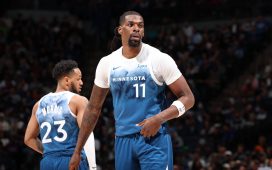Editor’s Note: Masai Ujiri is the president of basketball operations for the Toronto Raptors, one of the highest-ranking Black executives in all of sports. He built the Raptors into an NBA champion in 2019. Below is a guest column that he has written for The Athletic.
I was 12, or maybe 13, and I remember walking to the basketball courts at Ahmadu Bello University in Zaria, Nigeria. I imagined myself playing college basketball like Hakeem Olajuwon – I had watched him on the videotapes my mom brought home whenever she traveled for work, thrilled that a Nigerian like me was becoming a global star. In front of that flickering screen, and on that court, my basketball dreams took flight.
Fast forward to June 2019. I was on a stage with Serge Ibaka, from the Republic of Congo, and Pascal Siakam, who draped the flag of his native Cameroon around his shoulders as we celebrated the Toronto Raptors’ first NBA Championship. Three Africans, at the very top of the NBA. That night, their – and my – basketball dreams came true.
Who knows what dreams the Basketball Africa League, now underway in Kigali, might spark? Maybe one of those young men will make the NBA. But let’s dream bigger: Maybe, a few years from now, that young man won’t have to leave Africa to play basketball at an elite level. Maybe there will be a league on the continent, providing opportunity not just for the people on the court, but the entire ecosystem that exists around professional sports. Media. Medical. Marketing.
And investment. More investment, less charity. This is what Africa wants.
The impact of the 12-team, 12-nation BAL will go beyond the lines of the basketball court. Economically, the potential for growth is phenomenal – even for those without an interest in our great game, the commercial opportunities and avenues for investment in advertising, broadcasting, merchandise, and more, will bring transformative money into African economies.
Globally, the sports industry is worth over half a trillion dollars, and it’s time for Africa to benefit from a greater share of that wealth. Already the BAL has struck deals with sponsors and partners who are global giants in their industries. These partners recognize the opportunity that the BAL provides, and have committed themselves to helping form the foundations of a revolution in African basketball.
That this tournament is going ahead at all is unbelievable – amid a global pandemic, Rwanda and its leadership have managed to pull off an amazing event. They were thorough, attentive, and very well-prepared. The country has been a magnet for investment, and you just have to look at the Kigali Arena, where the tournament is being played, to understand why. It’s a bold venture that shows the commitment of the government to high-level, international sport. Rwanda has set a standard that other African nations should aspire to – I look forward to seeing which country, which city, steps up next.
We should also thank the NBA for pulling off the unbelievable accomplishment of two Bubbles in one year. I’ve been fortunate enough to experience both, first in Orlando and now in Kigali. They’ve both been amazing experiences, completely memorable – for different reasons – and the organizers’ hard work and creativity has made all this possible. Thank you.
If you ask anybody in any game what they search hardest for – and find most challenging to locate – they’ll say, without hesitation, that it’s pure talent. Africa is the youngest continent on the planet, with 60 percent of the population under the age of 25. Just imagine the crazy, unimaginable amount of untapped talent that exists there.
In last year’s NBA draft, there were nine players with Nigerian roots. The Miami Heat alone have six players of Nigerian origin. So in Kigali, there were scouts in the stands from around the globe, poised to find the next Giannis Antetokounmpo, Joel Embiid or Pascal Siakam.
But let’s look carefully – in among those scouts sat local ones, pros who grew up in places like South Africa or South Sudan. There were coaches on the sidelines from Cameroon and Mozambique. Executives from Senegal. So the talent isn’t only on the court. And that’s the ecosystem I’m talking about.
Earlier this week, the NBA announced the formation of an investment entity to oversee the league’s business affairs on the continent. Who, really is shocked? I’ve been involved with NBA Africa for years – I know the dedication the league has to the development of the game on the continent. And I also understand why the NBA can see the potential in Africa – remember, this league is not in the business of bad investments.
So now, for a game invented by a Canadian, dominated by Americans, and beloved by the world, it’s Africa’s turn to show that the ball is also in our court.
(Photo: Cyril Ndegeya / Xinhua via Getty Images)








